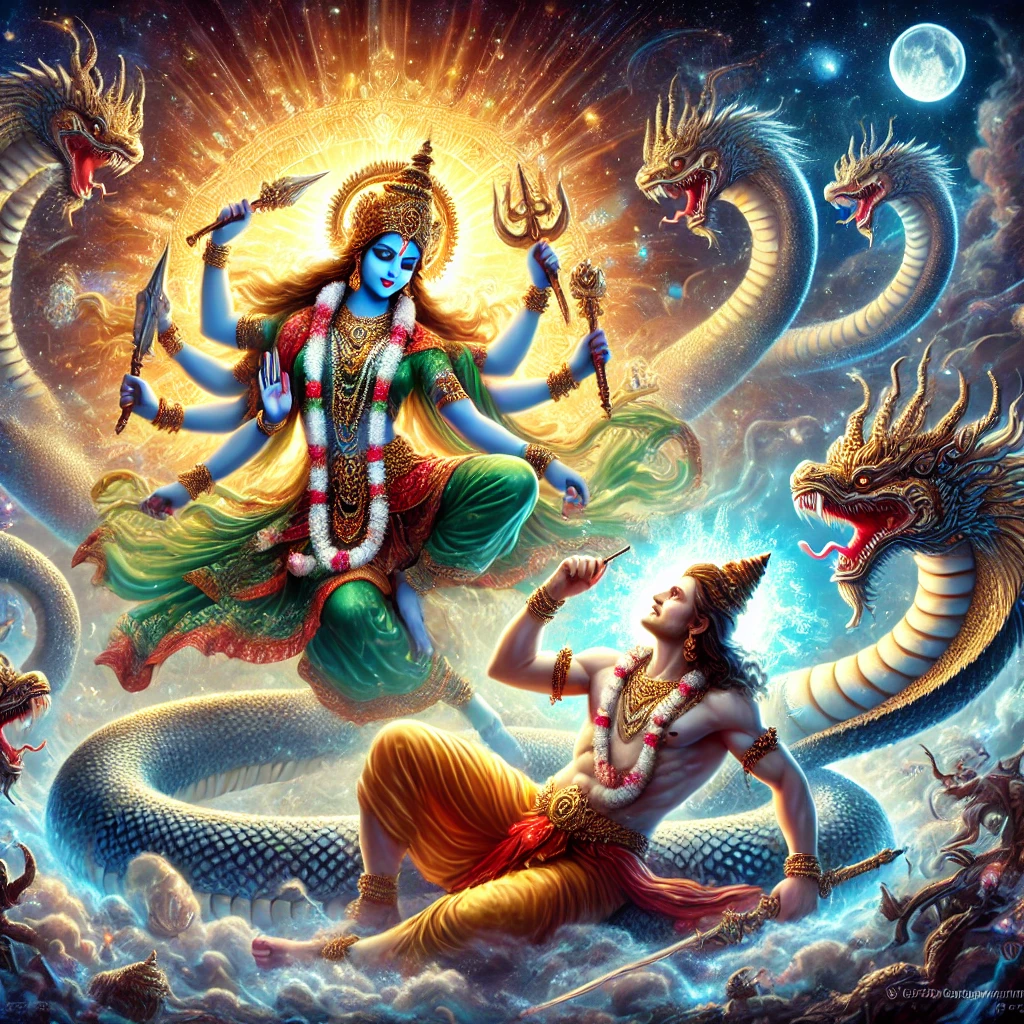Utpanna Ekadashi, observed during the Krishna Paksha (waning moon phase) of the Margashirsha month, marks the advent of the sacred Ekadashi fasts. This auspicious day is dedicated to Lord Vishnu and honours the divine emergence of Ekadashi Devi, a manifestation of the Lord’s power. Utpanna Ekadashi exemplifies the triumph of divine energy over demonic forces and the spiritual benefits of observing the Ekadashi vrata.

Scriptural Context
Utpanna Ekadashi is celebrated as the origin of the Ekadashi fasts and the advent of Ekadashi Devi, a divine manifestation of Lord Vishnu’s energy. According to the Padma Purana, this Ekadashi commemorates a significant cosmic battle between Vishnu and the demon Mura, a powerful asura who terrorized the worlds and sought to defeat the Lord while he rested in a cave at Badarikashrama.
When Mura attempted to attack the resting Lord Vishnu, a dazzling feminine form, Ekadashi Devi, emerged from Vishnu’s transcendental body. Radiant and armed, she defeated Mura and restored peace. Lord Vishnu, upon awakening, praised her valor and proclaimed that she would be revered as the presiding deity of Ekadashi. He further declared that those who observe the Ekadashi vrata (fast) with devotion would attain liberation (moksha) and divine blessings.
The essence of Utpanna Ekadashi is rooted in discipline and surrender to God’s will. The story highlights the transformative power of devotion and fasting, symbolizing the victory of spiritual strength over inner and outer evils.
Lord Vishnu’s Blessings to Ekadashi Devi
Pleased by her valor and devotion, Lord Vishnu proclaimed Ekadashi Devi as the embodiment of his spiritual potency. He blessed her, stating that those who observe the Ekadashi vrata with devotion and purity would be absolved of their sins and attain liberation. Since then, Utpanna Ekadashi is celebrated as the day Ekadashi Devi appeared and became the protector of dharma.
Scriptural References
- The Padma Purana and Skanda Purana detail the origin of Ekadashi Devi and her divine mission.
- The Vishnu Purana elaborates on the benefits of observing Ekadashi fasts, underscoring their power to purify the soul and lead to liberation.
- In the Bhagavad Gita, Lord Krishna frequently highlights the importance of devotion and self-restraint, principles exemplified by Ekadashi observances.
The story of Utpanna Ekadashi teaches that even in moments of rest or vulnerability, the divine protects and upholds dharma. Ekadashi Devi’s emergence signifies that God’s power manifests in infinite forms to guide and protect his devotees.
Spiritual Significance
Observing Utpanna Ekadashi is said to cleanse one’s sins and pave the way to moksha (liberation). It also instills discipline and devotion in the practitioner. The fast involves abstinence from grains, beans, and other restricted foods, emphasizing simplicity and spiritual engagement.
Key Rituals
- Preparation: Devotees wake early, take a sacred bath, and set intentions for the fast.
- Worship: Devotees offer prayers to Lord Vishnu, chant His holy names, and read scriptures like the Bhagavad Gita or Vishnu Sahasranama.
- Fasting: A complete fast or a partial fast is observed, depending on individual capacity.
- Ekadashi Vrat Katha: Listening to or reciting the story of Utpanna Ekadashi enhances the spiritual experience.